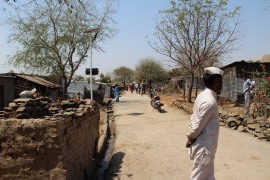Archive for March, 2015
Postcolonial Encounters
The University of Muenster (Germany) in collaboration with the Tata Institute of Social Sciences organized a three day workshop on Postcolonial Encounters at the TISS Tuljapur campus during 23-25 February 2015. The workshop brought together “young scholars and experienced researchers from the social sciences, culture and media studies and anthropology to enter into a conversation about pressing contemporary issues concerning changes in the political, religious and medical spheres”.
The workshop began with a discussion on what that colonial is and when did it start? It also discussed colonialism’s encounter with capitalism and modernity. Postcolonialism referred broadly to two things: (1) issues of linearity and temporality – from colonial to postcolonial and (2) question of ideology and theory that centers on issues like inequality and injustice.
Some scholars raised questions like: has colonialism really ended? What it means to be a dalit or a tribal in a postcolonial society like India? Others also raised question about modernity and modernization theory which assumed that Europe’s past is India’s future. Modernity can not only be explained through economic terms; it should also take into account the cultural frameworks and practices. There could be diverse Modernities or Multiple Modernities – European modernity, Indian Modernity, etc.
Prof. Kunhaman gave a paper on the political economy of development in India where he argued that development is not economic but more of a political concept. He also explained the postcolonial development in India from the perspectives of Gandhi, Nehru, Ambedkar and the Left. For Kunhaman, knowledge and thinking of those who are in power shape the policies of the day. He also noted that a person is capitalist only when he used capital for the exploitation of labour and appropriation of surplus value.
Prof. Abdul Shaban spoke about the Hindu-Muslim communal violence in India. According to him, communal violence has increased in postcolonial period compared to the colonial period. In the colonial period the British divide and rule policy played a major role in dividing communities. He argued that the occurrence of communal violence in the postcolonial period has moved from north and east of India to west and south part of India. Particularly, 1980s marked a rise in communal violence because of formation of the BJP (1980), Sikh militancy, Meenakshipuram conversion (1982), opening of Babri mosque to Hindu worshippers (1986) and militancy in Assam against Muslim migrants from Bangladesh.
Dr. Ramesh Jare spoke about the cast violence in Marathwada region. He discussed caste and reservation, the Poona pact, SC/ST Prevention of Atrocities Act 1989. Dr. Khalid Waseem spoke about challenges to multiculturalism in postcolonial nations. What exactly is the nationalist project? And, what is Postcolonialism? Is it a break from colonialism? In this context, Khalid discussed issues of nationalism, multiculturalism and the politics of recognition.
Dr. Sampat Kale, in his paper livelihood approaches to poverty reduction, argued that poor and marginalised constitutes 67% of the population. He described the concept of sustainable development as nirantar vikas or saswat vikas. He also noted that we have 600,000 villages in India; we also have 1,200,000 NGOs working. Despite this, poverty has not been reduced or the livelihood of the poor has not improved. Kunhaman argued that NGOs do not have accountability and therefore “civil service is better than civil society”. Ujjal Dadhich also gave a paper on provision of urban amenities in Jaipur.
The second day began with a presentation by Dr. Sarbeswar Sahoo, who gave a paper on the growth of Pentecostal Christianity and the question of Conversion in the Indian context. He argued that Pentecostal Christianity has come to establish itself as a religion of the poor and marginalised. He discussed the various factors responsible for the growth of Pentecostalism and the implications of such growth for tribal development, religious freedom and secularism in India.
Prof. Helene Basu discussed about decision-making and modernity. The question was: decision making – a prerogative of the modern? She spoke about the transpersonal decision-making. In her talk, Prof. Basu moved away from the rational choice analysis of modernity and described it in cultural terms. She also moved away from the “agency” oriented explanations of modernity and discussed it through transpersonal accounts.
Andreas Samland spoke about ethnographic film-making. Dr. Ashok Ohol discussed the various commissions that have been set up to prescribe policies for the development of notified and de-notified tribes in India. Dr. Sridhar Modugu gave a paper on postcolonial science studies in India and Dr. Byasa Maharana gave a paper on subalterns and the state in postcolonial India. Prof. Ramaih also gave a paper on religious rituals and beliefs in a village. Annika Strauss conducted an interesting laboratory on qualitative research and fieldwork.
The final day was kept for field visit. Some of the participants visited some villages and experienced and understood the life/problems of the people in the villages. A documentary on the “The Spirits of Envy” was also screened in the TISS campus. The three-day workshop was quite productive and innovative.




